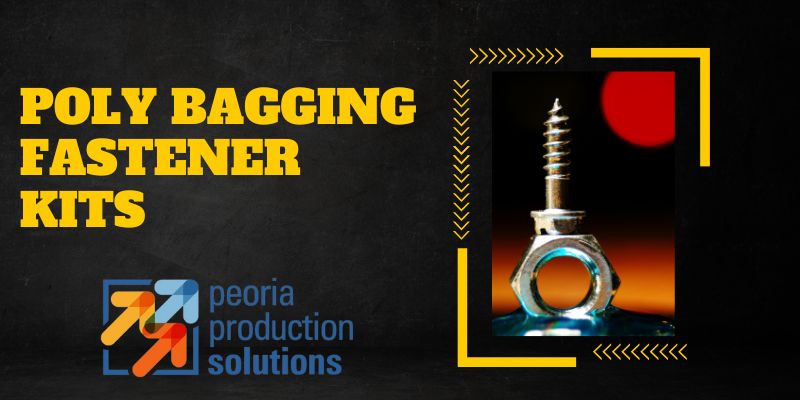
Auto bagging hardware pieces like fasteners, nuts, and bolts, with other necessary materials, is a popular custom kitting technique. Polybagging fastener kits saves time for field personnel to have the right parts ready when needed or provides a convenient package for the end-user.
Fastener Kits Save Time with Convenience
Fastener kits put together for specific tasks such as assembling furniture or for specific repairs such as computer repairs or kits containing skateboard hardware, for example, give the buyer everything they need in one convenient, protected pouch. Polybagging hardware and fastener kits is also a common practice during manufacturing processes where operators require specific parts during their assembly application. Fastener kits can be provided along with products during a manufacturing process and sometimes sold on their own for specific processes, such as a picture hanging kit.
Designing Custom Poly Bagging Fastener Kits
Auto poly bagging processes are used in many applications for retail, commercial, and industrial applications to protect specific merchandise required for production, shipping, or sale. Identification tags can be attached to poly bags to indicate the number of products included, with barcode labels for tracking purposes. This one SKU can replace the numerous individual SKUs of all parts included, improving inventory movement applications.
Designing a poly bagging process requires careful consideration of a few important factors:
- The specific products included in the bag
- The number of products to be auto bagged
- The type of poly bag or pouch most beneficial for packaging
Determining the exact products to be included is one of the most obvious important decisions to make when designing an auto-bagging process. Fasteners can be included with other required hardware or products, such as plastic parts or adhesives. Printed materials can also be included, such as an inventory list of kit contents and assembly instructions.
The quantity of custom poly bagged products is a critical decision to ensure all required parts are included in possibly a couple of extra fasteners or nuts and bolts if some get lost or damaged. Companies also must ensure they have adequate inventory to maintain custom bagging processes to support product ordering and sales.
The type of packaging is another critical decision, as there are several different types of poly bags available in different sizes, shapes, weights, and thicknesses. The type of packaging chosen should protect the parts inside for proper bagging and sealing, with the most efficient material available without jeopardizing product or process quality.
Types of Poly Bags for Custom Auto Bagging and Kitting
There are several types of poly bags available for custom auto-bagging processes, which requires careful consideration of certain factors to choose the best type. Companies will want to consider the size of the bag required, the bag’s physical characteristics, and costs. Some bags will be visible to consumers, others will simply be used for protective packaging during shipping.
The most common types of poly bags include polyethylene and polypropylene types of bags, with many different variations of polyethylene density.
High-density polyethylene, HDPE – HDPE bags are less flexible and denser than other types of polyethylene bags providing excellent resistance to tears and punctures. HDPE bags are often used to package heavy items such as construction material, sand, and cement, but can also be useful for packaging bulk food items and irregularly shaped products with sharp edges that could poke a hole in other types of bags.
Low-density polyethylene, LDPE – LDPE bags are less dense than HDPE bags providing more flexibility and clarity to see products on the inside. LDPE bags tear easier than other types of bags, which is convenient for products that require easy access, lightweight, and have visibility, such as for small parts or temporary storage.
Linear low-density polyethylene, LLDPE – LLDPE bags provide higher tensile strength and puncture resistance than LDPE bags without jeopardizing flexibility. LLDPE bags can save money with thinner gauge material and still provide strength, making them common for grocery store use, where clarity is not an issue.
Medium-density polyethylene, MDPE – MDPE is not quite as dense as HDPE, although it still provides heavy-duty properties with resistance to stress and cracking. MDPE bags are useful to protect against external damage, debris, and moisture.
Polypropylene, PP – PP bags are the second most common type of bags used compared to polyethylene bags and are growing in popularity due to high tensile strength and clear visibility. Polypropylene provides increased resistance to heat and chemicals over polyethylene.
These are some of the most common types of bags used for auto-bagging processes, although consulting with an experienced custom kitting and auto bagging provider will help you determine the right type of materials for your process.
Peoria Production Solutions, PPS, offers more than 80 years of experience as a contract packaging provider, offering all types of packaging services, including auto bagging. We utilize modern auto bagging equipment, heat sealers, heat tunnels, band sealers, hot stamp imprinters, and other auto bagging technology combined with a skilled, trained staff. Contact us to learn how to improve your poly bagging application with an experienced, quality-minded auto bagging provider.
